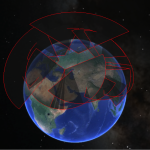- Deterrence: Revealed: Russia’s ambitious new ICBM early warning system
- Governance: Democracy takes shape through street protests over security bills, says leading scholar
 DETERRENCE: Revealed: Russia’s ambitious new ICBM early warning system, Sputnik News (19 August 2015)
DETERRENCE: Revealed: Russia’s ambitious new ICBM early warning system, Sputnik News (19 August 2015)
The main contractor for Russia’s strategic early warning system is under severe financial pressure. Its designer admits that the new system of satellites, ground radars and drones is error prone. “The system’s ground echelon…is a uniquely complicated technical system and malfunctions cannot be excluded. Here a lot depends on how the system’s various components interact with one another: the false alarms that can occur in one station must be quickly analyzed and verified by the command post.”
- Russia’s satellite nuclear warning system down until november, The Moscow Times (30 June 2015)
- Early warning, Russian Strategic Forces
- Nuclear command-and-control in the Millenials era, Peter Hayes, NAPSNet Special Reports (17 February 2015) [PDF, 0.4MB]
GOVERNANCE AND CIVIL SOCIETY: Democracy takes shape through street protests over security bills, says leading scholar, Ryota Goto, Asahi Shimbun (19 September 2015)
The contentious public debate over recently passed security bills may be the beginnings of a new type of democracy in Japan, one led by the general public to mobilize on their own in mass protests. One scholar calls this “counter-democracy”. Demonstrators also accuse the police of unjustly arresting and interrogating protestors. Neighboring countries are worried about the implications of the new bill.
- China: Japan security law a ‘threat’ to regional peace, AFP (19 September 2015)
- Japan’s security bills: ASEAN’s big worry, Kavi Chongkittavorn, The Nation (28 September 2015)
- Supporters demand security bill protestors be released following ‘unjust arrests’, Tomohiro Asaki, Japan Times (25 September 2015)
The Nautilus Peace and Security Weekly Report presents articles and full length reports each week in six categories: Austral security, nuclear deterrence, climate change and security, the DPRK, climate change adaptation and governance and civil society. Our team of contributors carefully select items that highlight the links between these themes and the three regions in which our offices are found — North America, Northeast Asia, and the Austral-Asia region.
Subscribe to NAPSNet to receive free weekly email reports.
- Editor: Arabella Imhoff
Contributors:
- Deterrence: Peter Hayes
- DPRK: Roger Cavazos
- Governance and Civil Society: Dyana Mardon
- Climate Change Adaptation: Saleem Janjua
- Climate Change and Security: Richard Tanter

